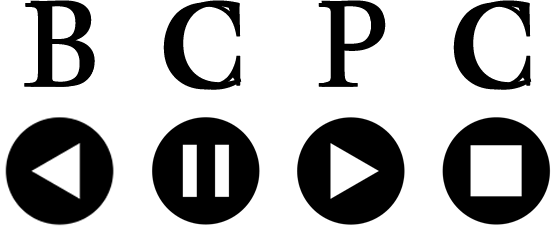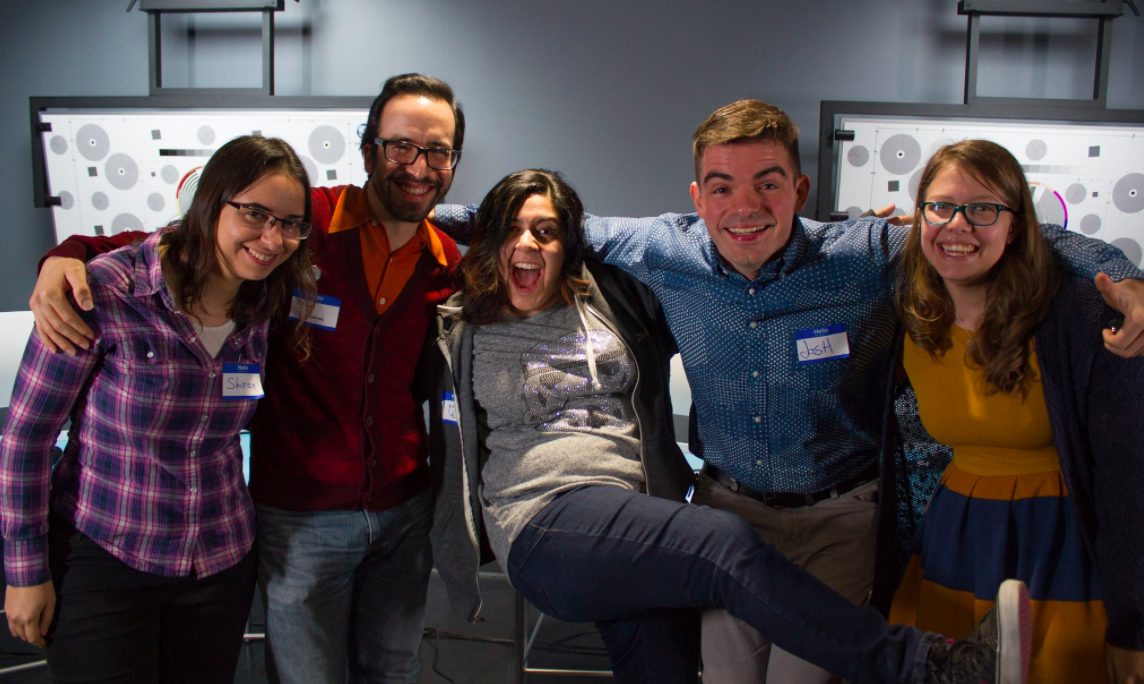BCPC Member Highlight: Ann Collins (New York)
/BCPC is a community that encompasses all of post production, all over the world. Some of our members are lively on Facebook, some are lurkers, and many are dedicated volunteers within one of our many programs. Every two weeks we introduce a member from somewhere in the world, to highlight and celebrate members of this amazing community.
I met Ann Collins at Sight, Sound & Story this year. She discussed the art of documentary storytelling on a panel and I was very inspired by her description of the patience she exercises in allowing a story to unfold. A great way to approach many hours of footage. I will never forget that advice and wanted to share her wisdom with all of you. Of course it helps that she is incredibly talented in winding a tale - her latest film is Joan Didion: The Center Will Not Hold. She has recently joined the BCPC - let's give her a big welcome!
- Give a brief summary of your trajectory into post in New York City...
I went to film school at NYU as an undergraduate. I kind of stumbled into the program; I wasn’t a student who passionately went in wanting to direct feature films, I was just curious about what they were doing in film school, and I must admit, I was a bit lost. Everyone wanted to be directors or cinematographers. I really enjoyed screenwriting classes and cinema studies classes, but I wasn’t sure what was going to happen to me once I graduated, how I was going to find a foothold in the film industry based on the fact that I liked writing dialogue and watching movies. In my senior year, Ian Maitland, a professor who taught a senior level production class, came up the aisle to where I was sitting in a very large theater-style classroom to hand me back a paper I had written for him. “You know, Ann,” he said, “I think you are an editor. You’re such a nice person, and you have all these ideas about story, and that’s what an editor is. I know – because I’m an editor, and editors are always the nicest people.” I was incredibly grateful to be given a direction in which to head! After that, I started reading independently about editing, and found a couple of internships in editing rooms. One of the internships was for Janet Swanson, an editor who worked a lot with the Maysles. We really hit it off, and she hired me to be her apprentice and then her assistant after I graduated. That work led to more assisting jobs, and I was an assistant for about 5 years, working in 16mm film and sitting in the room with editors like Larry Silk and Mona Davis. Finally, I was assisting Gini Reticker, who began her career as an editor. Gini was shooting her first film at the time, and she would leave the cutting room to go shoot for a half day, sometimes a couple of days at a time, and she would give me scenes to cut while she was gone. When the project was over, she asked me to cut her film, The Heart of the Matter, which went to Sundance. Talk about a lucky break!
- What do you love about being a documentary editor?
It’s often said the editor is the writer of a documentary, and I agree with that idea. Most documentary editors are storytellers, working in the language of cinema, and I find the process of telling a story in pictures and sound deeply satisfying. I love finding a story within the chaos of real life, within the hours and hours of footage I’m given, but moving beyond that, I’m also very excited about all of the conversations that go into that process. When I’m working, I’m listening to the director’s response to the footage and what I’m doing with it so I can figure out their vision, but I’m also listening for what the cinematographer is trying to communicate, what the characters are saying, and what the footage – the actual footage – is telling me it wants to be. Finding the story is exhilarating, and figuring out the best way to tell that story is what keeps me coming back day after day after day.
- How would you describe your approach to editing film? What is it important for emerging editors to know?
I am a big believer in process, in screening and selecting and doing rough cut after rough cut, in talking and talking and talking with a director. I think process, which is something we’ve developed in the 100 or more years since the invention of cinema, leads an editor to the answers they are seeking on a project. I also try to open my heart – it sounds a bit woo-woo, but it’s very effective – I open my heart to the people I am working with, and to the people who have generously allowed a camera into their lives. Opening your heart – I guess you could also call it being mindfully compassionate? – really keeps your ego in check, and lets you work honestly.
I think of editing as a practice, the way people have yoga practices or writing practices or painting practices. Editing isn’t something you learn quickly and then you know it all. It’s much more humbling than that. Every film, every scene, every day is new, and you have to be receptive to what is particular to each situation, otherwise your work loses its vitality. I think of the life of an editor as one of continuous learning. Sometimes you know exactly what to do, sometimes you’re really in the flow. Sometimes it’s more challenging, and you have to wait for that bliss to kick in, and that’s where process comes in and supports you until you figure it out.
I think its important for emerging editors to remember we are a community. It’s not a competition, it’s about all of us working to move the craft forward and to support each other along the way. I take great pleasure in recommending other editors for jobs for which I’m not available, and I’m thrilled when editor friends do great work, or receive recognition for their work. When one of us does well, we all benefit, and it is our responsibility to nurture a community in which we succeed together.
- What and where is your favorite place to unwind after a long day? How do you self-care?
Oh, that’s a tricky one. I am the mother of two teenage boys, and when I get home, there is dinner to make and homework to check and all of the things that go into running a household, so it’s not that I get home and unwind, it’s that I get home and I’m thrown into a different type of joy. My husband is also an editor, so we are very sympathetic to each other’s state of exhaustion at the end of the day, and we share a lot of that work. I self-care in the early morning by running (I train for half marathons a couple of times a year) and by meditating. I also try to see a lot of art. I go to galleries or museum shows, and I read a lot. When I’m not working, I write.
- What is the the one thing outside of your work that you geek out about the most?
The precision of language. I’m a stickler for grammar and for finding the exact perfect word.
- What is the best advice that has ever been given to you?
Laughter is essential to the creative process. Vinny Stenerson, a very talented and generous editor I worked with when I was an assistant, used to say that. He believed – and I do too – that you have to keep the mood in the editing room light and you have to laugh a lot because that allows you to take risks and to follow whatever bubbles up in your mind. You can’t cut – at least I can’t – if people in the room are angry or tense. As an editor, you have to set the tone so that every one who comes into the room, yourself included, feels at home and at ease.
- What achievement are you most proud of?
Oooh, another tricky one. I’m going to pretend I don’t see the question implies a single answer and give you a few things:
I am incredibly proud of Joan Didion: The Center Will Not Hold. The entire production team on that film was very strong, and Griffin Dunne, our director and guide, inspired great things from all of us. I’m also proud of Swim Team, which Lara Stolman directed, and the way it continues to redefine disability and the ways we see people who are not typical. But I’m also crazy proud of my sons and who they are becoming. They’re both artists and storytellers, but they are also deeply compassionate souls, so I feel very good about the prospect of setting them loose in the world.
- If you won the lottery today, and never needed to work again, how would you spend the rest of your life?
What a delicious question! I think I would choose to live part of the year in Ireland and part of the year in New York, maybe with a home upstate or on Shelter Island or someplace where I could breathe a little. I would certainly spend more time writing, but I don’t think I would give up editing entirely. I might work as more of a mentor, maybe consulting for free on projects that resonate most with me, but I also think I would continue to collaborate as an editor. Some of the dearest people in my life are the filmmakers I’ve had the privilege to work with, and some of my happiest moments have been spent sitting at an Avid, so it would be silly to cut myself off from that—but I do think I would give myself much longer stretches between projects.
- What are people always surprised to learn about you?
How solitary I can be. I’m very upbeat and social, and I try to keep things positive at work, but a part of me really needs to be in silence and solitude, at least some of the time – it makes sense that I would seek out a profession which lets me be alone in a small dark room most days, but people don’t always equate that with my personality.
- If you could time-travel, where and when would you go?
I have this Doctor Who fantasy: My husband is a huge jazz fan, so I’d like to be able to take him back in time to the days when Miles Davis was playing club dates, and to take my husband to hear him play. Wouldn’t that be an amazing date-night? Honey, we’re going to travel through time tonight for a glass of wine and to hear Miles. . .
- What inspired you to be a member of the BCPC and how long have you been with us?
I was invited to join by Janis Vogel, and thank you Janis! I checked out the facebook page and was moved by the community I found there. It’s easy, sitting in front of computer screens and working such long hours every day, to begin to feel isolated and to lose your sense of community. BCPC is a great way to restore a sense of the social to a group of people who share a very esoteric passion.












